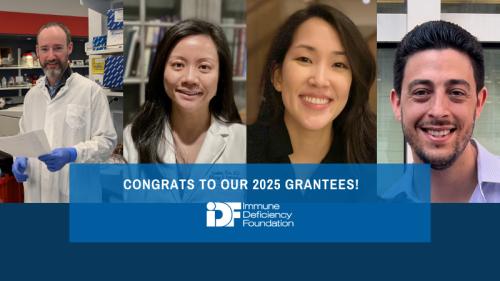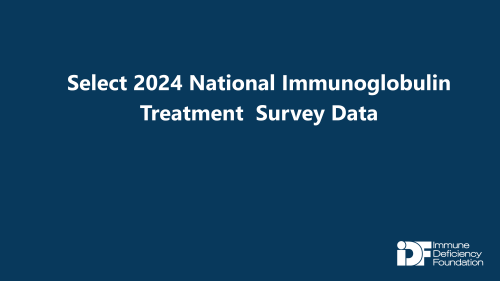
-
Understanding primary immunodeficiency (PI)

Understanding PI
The more you understand about primary immunodeficiency (PI), the better you can live with the disease or support others in your life with PI. Learn more about PI, including the various diagnoses and treatment options.
-
Living with PI
-
Addressing mental health
-
Explaining your diagnosis
- General care
- Get support
- For parents and guardians
-
Managing workplace issues
- Navigating insurance
-
Traveling safely

Living with PI
Living with primary immunodeficiency (PI) can be challenging, but you’re not alone—many people with PI lead full and active lives. With the right support and resources, you can, too.
-
Addressing mental health
-
Get involved

Get involved
Be a hero for those with PI. Change lives by promoting primary immunodeficiency (PI) awareness and taking action in your community through advocacy, donating, volunteering, or fundraising.
-
Advancing research and clinical care
-
Research Grant Program
-
Consulting immunologist
-
Diagnosing PI
-
Getting prior authorization
-
Clinician education
-
Survey research
-
Participating in clinical trials

Advancing research and clinical care
Whether you’re a clinician, researcher, or an individual with primary immunodeficiency (PI), IDF has resources to help you advance the field. Get details on surveys, grants, and clinical trials.
-
Research Grant Program
A new treatment for patients with X-linked chronic granulomatous disease (CGD) fighting infections that don’t respond to intensive antibiotics could be on the horizon—but researchers need help from members of the CGD community to complete a clinical trial.
About 5% of individuals with CGD experience fungal and bacterial infections that don’t clear up with standard antibiotic therapy. In these cases, patients can be treated with healthy granulocytes—a type of white blood cell—from HLA-matched donors. This short-term treatment can help the patient get healthy enough for bone marrow transplant (BMT), a long-term treatment for CGD. However, matched donors are often in short supply. In addition, patients sometimes develop anti-HLA antibodies to the donor granulocytes, prohibiting them from receiving granulocytes in the future and increasing their risk of graft versus host disease if they opt for a BMT.
Persons with X-linked CGD have a variant in the gene for NADPH oxidase that makes their granulocytes unable to produce the hydrogen peroxide necessary to kill certain fungi and bacteria. This variant leaves those with CGD vulnerable to infection. In the clinical trial, researchers at the National Institute of Allergy and Infectious Diseases (NIAID) are testing the safety and feasibility of modifying an individual’s own granulocytes with functional NADPH oxidase messenger RNA (mRNA) as an alternative to receiving HLA-matched donor granulocytes.
The clinical trial is recruiting healthy men with X-linked CGD between the ages of 18-75 to participate. In a multi-step process, participants take medication to stimulate granulocyte production, and their extra granulocytes are then collected through apheresis. Researchers modify the granulocytes using mRNA to deliver the correct instructions for the NADPH oxidase enzyme. Participants receive the modified granulocytes the day after their apheresis and are monitored for three additional days. The hospital stay for the study is at least seven days, and there is a 3-month follow-up visit.
In the first phase of the clinical trial, two persons with CGD received the modified granulocytes. One person responded well with no side effects. The other experienced elevated liver enzymes that were possibly related to the treatment but could have also been due to antibiotics and other medications.
Unlike gene therapy, where a person’s blood-forming stem cells are modified with DNA, modifying cells with mRNA is not permanent. The eventual goal is to be able to use the procedure to treat CGD patients with severe infections, providing them with the ability to kill germs long enough to recover from the infection.
“If this [procedure] were to be demonstrated to be safe and effective, the patient would be their own granulocyte donor, so finding donors would not be a problem, and patients would not develop anti-HLA antibodies since their own neutrophils would be used,” explained Dr. Harry Malech, an investigator on the study.
Related resources
Sign up for updates from IDF
Receive news and helpful resources to your cell phone or inbox. You can change or cancel your subscription at any time.





The Immune Deficiency Foundation improves the diagnosis, treatment, and quality of life for every person affected by primary immunodeficiency.
We foster a community that is connected, engaged, and empowered through advocacy, education, and research.
Combined Charity Campaign | CFC# 66309




